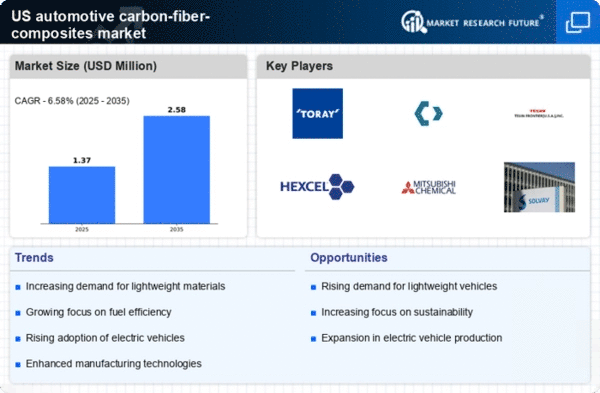The US Automotive Composites Market is experiencing significant growth as the automotive industry pivots towards lightweight materials to enhance vehicle efficiency and sustainability. The integration of composites such as carbon fiber, glass fiber, and natural fiber into vehicle construction is reshaping design and functionality while maintaining durability and reducing weight. This evolution is driven by regulatory pressures for improved fuel economy and decreasing carbon emissions, compelling manufacturers to explore innovative materials that meet stringent safety and performance standards.
The competitive landscape is a mix of established players and new entrants, each leveraging technology and research to yield advanced composite materials that cater to changing consumer demands and market trends.PROCOMPOSITES stands as a formidable player in the US Automotive Composites Market, known for its innovative solutions that enhance vehicle performance through weight reduction and increased fuel efficiency. The company's strengths lie in its robust R&D capabilities, enabling the development of cutting-edge composite materials tailored to automotive applications. With a focus on sustainability, PROCOMPOSITES prioritizes the use of eco-friendly materials without compromising quality, thus appealing to environmentally conscious manufacturers.
By establishing strong partnerships across the supply chain, PROCOMPOSITES has effectively positioned itself as a trusted provider in the market, enhancing its competitive edge and ensuring a resilient presence amid evolving industry challenges.BASF commands a significant position in the US Automotive Composites Market, offering a diverse portfolio of products and solutions tailored to the automotive sector. The company is recognized for its advanced polymers, resins, and additives that enhance the performance and aesthetics of automotive composites.
BASF's commitment to innovation is underscored by its extensive research initiatives that frequently result in the introduction of novel composite technologies, ensuring the company stays at the forefront of industry advancements. Furthermore, BASF has been actively involved in strategic mergers and acquisitions, expanding its capabilities and market reach within the US. This approach not only strengthens its product offerings but also reinforces its dedication to sustainability and circular economy practices, making it a robust competitor in the ever-evolving automotive composites domain.






















Leave a Comment